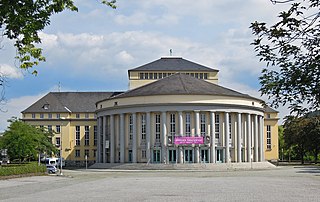
The Bavarian State Opera is a German opera company based in Munich. Its main venue is the Nationaltheater München, and its orchestra the Bavarian State Orchestra.
The Bavarian State Orchestra is the orchestra of the Bavarian State Opera in Munich, Germany. It has given its own series of concerts, the Akademiekonzerte, since 1811.

Ulf Schirmer is a German conductor and opera house administrator.

The Badisches Staatstheater Karlsruhe is a theatre and opera house in Karlsruhe, Germany. It has existed in its present form and place at Ettlinger Tor since 1975. Achim Thorwald became the Intendant in summer 2002 and held that post until the end of the 2010/11 season. Peter Spuhler succeeded him at the beginning of the 2011/12 season and continues to serve in that post.

The Internationale Maifestspiele Wiesbaden is a theater festival in Wiesbaden, Germany. Established in the late 19th century after the Bayreuth Festival, the festival is one of the most distinguished international theatre and music festivals in the world. It is presented annually in May at the Hessisches Staatstheater Wiesbaden, the State Theatre of Hesse in the capital Wiesbaden. The festival currently features performances of operas, ballets, plays and musicals. Visiting companies, mostly from European theaters, present their recent productions along with performances of the Theater Wiesbaden. Concerts from a wide array of music genres are featured as well as artistic circus acts and modern dance presentations. Lectures, recitals, cabaret performances, art showings and readings are also part of the program.

Lolita (Лолита) is an opera in two acts by composer Rodion Shchedrin. Composed in 1992, it uses a Russian language libretto by the composer which is based on Vladimir Nabokov's 1955 novel of the same name, written in English. The opera premiered in 1994 at the Royal Swedish Opera, Stockholm, using a Swedish language translation of the original libretto.

The Staatstheater Mainz is a theatre in Mainz, Germany, which is owned and operated by the state of Rhineland-Palatinate. Situated on the Gutenbergplatz, the complex comprises two theatres which are connected by an underground passage and also by skywalk. Performances of opera, drama and ballet are presented. Its name was Stadttheater Mainz until 1989.

The Staatstheater Darmstadt is a theatre company and building in Darmstadt, Hesse, Germany, presenting opera, ballet, plays and concerts. It is funded by the state of Hesse and the city of Darmstadt. Its history began in 1711 with a court theatre building. From 1919 it was run as Landestheater Darmstadt. The present theatre was opened in 1972 when the company was named Staatstheater.

Siegfried Köhler was a German conductor and composer of classical music. He worked as general music director of opera houses such as Hessisches Staatstheater Wiesbaden and the Royal Swedish Opera. Köhler conducted premieres of works by Hans Werner Henze and Volker David Kirchner, among others, and revived rarely performed operas. He also composed music for the stage and taught at universities of music in Cologne and Saarbrücken.

Albert Horne is a South African-born chorus master and orchestral conductor, whose focus is opera chorus preparation and operatic performances. He worked for the Cape Town Opera and has been chorus master and conductor at the Hessisches Staatstheater Wiesbaden since 2014.

Uwe Eric Laufenberg is a German actor, stage director for play and opera, and theatre manager who has directed at international opera houses and festivals, such as Elektra at the Vienna State Opera and Parsifal at the Bayreuth Festival.
Karl Maria Zwißler was a German conductor, and academic. He was for decades the Generalmusikdirektor and Intendant of the Staatstheater Mainz. He taught conducting at the music universities of Stuttgart and Frankfurt.

Maria Bengtsson is a Swedish operatic soprano, who has appeared in major opera houses in Europe. She is known for roles in operas by Mozart and Richard Strauss.

Claus Leininger was a German stage director in theatre and opera, and an intendant. He shaped the artistic profile of the Musiktheater im Revier in Gelsenkirchen, nicknamed the Ruhr-Scala during his tenure, and the Hessisches Staatstheater Wiesbaden.
Marc Piollet is a French conductor. After positions at the Staatstheater Kassel and Volksoper in Vienna, he was Generalmusikdirektor (GMD) at the Hessisches Staatstheater Wiesbaden from 2004 to 2012.
Patrick Lange is a German conductor.

Theater Saarbrücken, officially Saarländisches Staatstheater since 1971, is the state theatre of Saarland in its capital Saarbrücken, Germany. It has several divisions and offers annually around 30 new productions in around 700 events for more than 200,000 people. Its venues are Großes Haus, Alte Feuerwache, Congresshalle and sparte4. While theatre in Saarbrücken has a long history, the present main venue was completed in 1938, with plans commissioned by the Nazi regime.

The Staatstheater Cottbus is the only state theatre of the German federal state of Brandenburg in Cottbus. It has its own ensemble presenting plays, operas, operettas, musicals, orchestral concerts and ballet. The theatre had more than 130.000 spectators in 2013.
Michael Helmrath is a German oboist and conductor and since the 2016/2017 season, active as General Music Director of the Theater Nordhausen/Loh-Orchester Sondershausen.
Heribert Esser is a German conductor and academic teacher. In 1962–1986, he held the position of director of music at Braunschweig, and the Elder Chair of Music at the Elder Conservatorium of Music of the University of Adelaide, South Australia, from 1987 to 1994. Most recently he conducted the Philharmonisches Staatsorchester Halle.



















